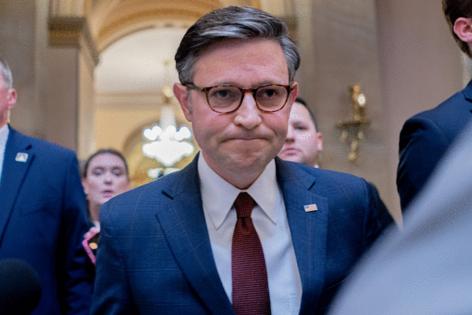Conservatives chafe at taking Medicaid savings options off table
Published in Political News
WASHINGTON — House Republican leadership’s decision to step back from two pathways to major Medicaid cost savings has fueled contempt among hard-line conservatives, raising questions about the future of a reconciliation package that faces a key markup next week.
The proposals would have cut federal Medicaid spending by billions of dollars, but they could not gain enough support from a key group of more moderate GOP lawmakers.
Meanwhile, a Congressional Budget Office analysis released Wednesday morning shows those Medicaid proposals and others under consideration could lead to steep losses in health care coverage for millions of people, making it even less likely that the moderates would support cuts that could threaten their constituents.
Republican leadership is racing to find savings to help pay for President Donald Trump’s “big, beautiful” reconciliation bill before a markup the Energy and Commerce Committee aims to hold next week.
Conservatives on Wednesday framed the decision by Speaker Mike Johnson, R-La., as an embrace of “Obamacare” that will harm the traditional Medicaid population: low-income parents, pregnant women, people with disabilities and children.
Johnson said Tuesday after meeting with about a dozen moderates that state per capita caps and reductions to the federal match for Medicaid expansion were no longer on the table. Both proposals could shift hundreds of billions of dollars in Medicaid costs from the federal government to states, depending on how the provisions are structured.
Following a four-hour, closed-door meeting on Wednesday, House Energy and Commerce Republicans largely dodged questions from reporters on whether they’ve reached consensus on Medicaid offsets.
When asked whether a markup was still on track for next week, Chairman Brett Guthrie, R-Ky., one of the only lawmakers willing to comment, said, “We’re hoping to.”
Guthrie said members were “still working through all the provisions” and declined to say whether they had agreed to certain policies.
But he also said discussion of per capita caps for states’ Medicaid expansion programs was not off the table, contrary to what Johnson had told reporters Tuesday evening.
“My understanding of what I saw is that per capita caps were still alive,” said Guthrie, who acknowledged he was not part of the discussions on Tuesday.
Guthrie said members are “engaged and involved” in the process and that future meetings aimed at reaching an agreement on a draft bill were likely.
It’s not clear whether such meetings will result in bridging the gap between the party’s moderates and conservatives.
“We must end Obamacare’s much higher reimbursement for able-bodied adults on Medicaid,” the House Freedom Caucus posted Wednesday morning on X.
Rep. Eric Burlison, R-Mo., called it “unequivocally unethical to allow Medicaid to be plundered by fraudulent schemes like California’s MCO tax,” referring to a state-based initiative to generate Medicaid revenue by taxing health insurers.
Rep. Mark Harris, R-N.C., during a C-SPAN interview Wednesday morning, critiqued the decision to retain a higher federal match for adult beneficiaries in states that expanded Medicaid under the 2010 health care law.
Harris referenced a common theme in the debate that the federal match for a hypothetical man living in his mother’s basement shouldn’t be higher than a single mom.
“These kinds of things are going to develop. It’s going to be up to this administration and this Congress to work to fix these issues,” Harris said. “I think that’s where we’re headed.”
A key part of conservatives’ argument is that the current structure of federal Medicaid spending is unfair. The federal government pays 90% of the costs to cover low-income adults in Medicaid expansion states, versus a range from 50% to 77% of the costs for the traditional Medicaid population.
The higher rate for the expansion population was intended to incentivize states to expand Medicaid.
Cost analysis
The CBO analysis, requested by Senate Finance ranking member Ron Wyden, D-Ore., and House Energy and Commerce ranking member Frank Pallone Jr., D-N.J., found that five policy options floated by Republicans for inclusion in the reconciliation bill would lead to a reduction in Medicaid coverage.
The CBO estimated that four of those options would force states to increase their spending on Medicaid, decrease provider payment rates, shrink optional benefits and decrease Medicaid enrollment.
The analysis, published Wednesday, estimates that reducing the federal match for Medicaid expansion would have been the biggest cost saver, lowering the federal deficit by $710 billion over 10 years while 5.5 million fewer people would be covered under Medicaid by 2034.
Millions of those beneficiaries would obtain alternative coverage through the 2010 law’s exchanges or through employers, the CBO estimated, so the total number of uninsured would rise a little less drastically. Still, there would be 2.4 million more uninsured under the reduced federal match proposal, the analysis said.
The option to end states’ ability to tax health care providers to leverage a higher federal match rate from the government would save an estimated $668 billion and result in 8.6 million people losing Medicaid coverage by the end of the 10-year period, with the total uninsured population rising by 3.9 million.
The estimate also looked at the impact of capping Medicaid spending per enrollee, both in the entire Medicaid population and for the Medicaid expansion population only.
Caps instituted throughout Medicaid could save $682 billion while increasing churn by 5.8 million people, with 2.9 million losing coverage altogether. Caps on the Medicaid expansion only would decrease the deficit by $225 billion while decreasing Medicaid coverage by 3.3 million people and causing the number of uninsured to rise by 1.5 million.
The fifth option, repealing a Biden administration rule intended to streamline eligibility and enrollment in Medicaid, would decrease Medicaid enrollment by 2.3 million people, increase the number of uninsured by 600,000, and save $162 billion, the CBO said.
_____
(Lia DeGroot contributed to this report.)
_____
©2025 CQ-Roll Call, Inc., All Rights Reserved. Visit cqrollcall.com. Distributed by Tribune Content Agency, LLC.




























































Comments